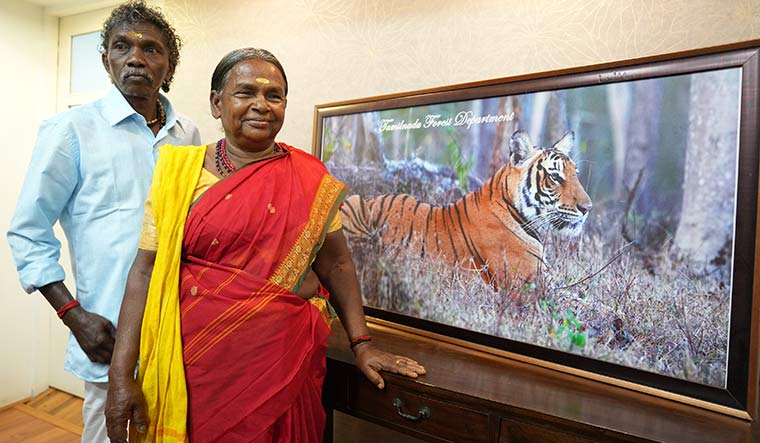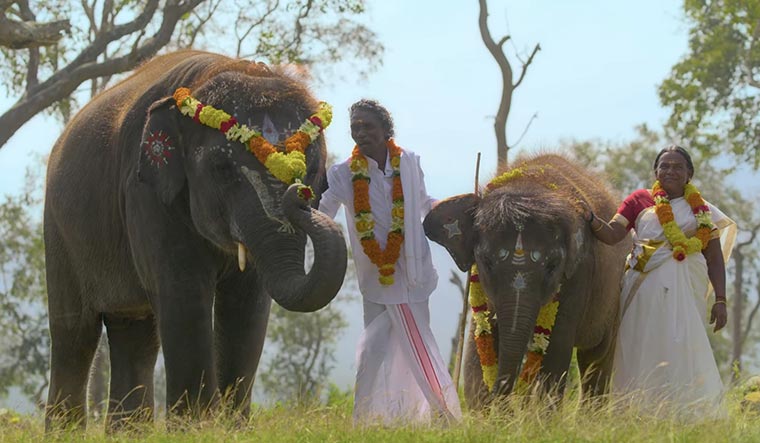Far away from the cries of joy at the Dolby Theatre in Los Angeles following The Elephant Whisperers’ historic Oscar win, Bomman was straining his ears for a different cry inside the Palacode forest in Marandahalli in Tamil Nadu’s Dharmapuri district. Bomman, one-half of the elephant whisperer couple featured in the Netflix documentary, had spent three sleepless nights searching for two baby elephants, who had lost their mother to electrocution. “How am I going to unite them with the herd? I am worried about the little one,” he tells THE WEEK. “The little one kept crying for milk and did not eat anything for the past three days. I kept coming back to the spot where the mother elephant and a Makhna (a male elephant without tusks) were buried. How can I eat or sleep after seeing this?” As he talks about the baby elephant, he remembers Raghu and Ammu, the calves he raised with his wife Bellie, in The Elephant Whisperers.
Bellie, meanwhile, is busy receiving plaudits for the Oscar nod from her indigenous Kattunayakan community in Theppakadu, near the picturesque Mudumalai Tiger Reserve in the Nilgiris. “I am overwhelmed as the world now talks about elephants and elephant caretakers,” she tells THE WEEK.
Bomman left Dharmapuri only after Chief Minister M.K. Stalin asked him to come to Chennai. His phone has been ringing incessantly. “I have been getting congratulatory calls from everyone,” he says after meeting Stalin at the state secretariat in Chennai. “I am happy. But I will be very happy only when I am able to rescue the little one. I have to reunite it with the herd or take it to the Theppakadu elephant camp in the Mudumalai range.”
Sitting next to Bomman―his wiry hair oiled and neatly combed and with a dash of sandalwood paste on his forehead―is a smiling Bellie, clad in a red sari with a yellow towel on her right shoulder. She has come all the way from Theppakadu with her daughter Manju Sivakumar, 30. “I accompanied my mother as she hasn’t travelled anywhere out of Theppakadu,” Manju tells THE WEEK. Bomman and Bellie were brought to Chennai by forest officials as Stalin wanted to congratulate the couple. Bellie is confident that Bomman can unite the baby elephant with the herd. “If not, we can care for it and raise it, like we did with Raghu, if the forest department asks us to,” she says.
Bomman and Bellie, both 54, are now superstars among the Kattunayakans, a particularly vulnerable tribal group that has settled in Kerala and Tamil Nadu. Kattu or kadu means forest and nayakan means leader or chief, essentially connoting that Kattunayakans are lords of the forest―their sustenance comes from the forest and they, in turn, protect it. In Tamil Nadu, the Kattunayakans are traditional dwellers of the Mudumalai forests in the Nilgiris.
The 40-minute documentary, directed by Kartiki Gonsalves and produced by Guneet Monga, is based on the life and work of Bomman and Bellie. Bomman hails from a family of mahouts. He took on the mantle after his father’s death. He is an expert in locating abandoned calves and uniting them with the herd, making him a favourite of the Tamil Nadu forest department. A few years before Raghu and subsequently Bellie and Ammu walked into his life, Bomman used to do odd jobs for the forest department; he had also separated from his first wife then. After Raghu’s arrival, his life changed, for the good.
Raghu came to Bomman injured, covered in bites by stray dogs. He was rescued by forest officials from Denkanikottai, a semi-urban panchayat town near Krishnagiri in north Tamil Nadu in 2017. “The calves get lost if they have an injury or cannot keep pace with the herd,” says a forest official who cared for Raghu along with Bomman and Bellie at the elephant camp. “Sometimes, after going deep into the forest, the mother elephant or the entire herd comes back to take the calf. Sometimes, the calf is abandoned. Raghu was one such abandoned calf, which got lost and then suffered injuries because of dog bites.”
 In lockstep: Bomman and Bellie after meeting Chief Minister M.K. Stalin in Chennai | R.G. Sasthaa
In lockstep: Bomman and Bellie after meeting Chief Minister M.K. Stalin in Chennai | R.G. Sasthaa
Bomman was asked to foster Raghu, but because he was grievously injured, he needed motherly care and psychological support. And so, Bellie was brought in to help. Bellie’s first husband―Sennan―used to help the forest department in carrying out the wildlife census. She had three children―a son and two daughters. Her husband was killed by a leopard in the forest. “He died on the spot,” says Manju, who was all of seven then. “The leopard was sitting on a tree branch and he was standing under the tree. The leopard jumped on him and bit him in the neck. After his death, my mother raised us.”
Bellie’s other daughter―middle child―died by suicide. She talked about losing her daughter in the documentary and how Raghu consoled her. Manju lives with her husband and daughter in Mudumalai. Her eyes light up when she talks about her daughter, who was in the documentary. Bellie’s elder son, Kaalan Sennan, works with the forest department at the Thepakkadu elephant camp. Today, both Bomman and Bellie have become elephant caretakers at the camp. “I am happy with the work I do,” says Bellie. And, it was while caring for Raghu and Ammu, who was brought to them in 2019, that love bloomed among the two―their wedding was also part of the documentary. “I have told him to do this job the forest department has given him,” says Bellie. “I told him that we can live together hereafter.”
As a mahout, Bomman knows well how to handle baby elephants. Under his care, Raghu and Ammu were fed milk and ragi balls as per the instruction of the veterinary doctors at the elephant camp. He would take them out on walks in the forest and also train them to live in the wild. Bellie initially had little knowledge about animals. Her first husband’s death had scared and scarred her. But Raghu and Ammu healed her―today, she is an expert in taking care of elephants. “If the elephant is sick or down with fever, its eyes will water nonstop, she says. “Its ears will turn warm. Elephants are just like human beings, and feel the same towards us like children feel for their parents.”
The elephants usually learn a lot from herd members. So the younger ones are tutored and trained like being in a herd. After three to four years the elephant is given from one mahout to another and then left in the forest, only if they are willing to go. Likewise, Raghu and Ammu are now with another mahout at the camp. When Raghu was handed over to another mahout, it broke Bellie’s heart. “I was worried as Raghu got separated from me and was moved to the elephant camp,” she says. “He is my child. Raghu will recognise me wherever he is.” And, Bellie had a short but emotional reunion with Raghu and Ammu before she came to Chennai. “The forest department helped me in raising them and now when I wanted to see them they helped me again,” she says.
The bond that the couple have with the animals and with each other shone through in the documentary. Gonsalves, says Bomman, knew him for some time. “She used to come to meet me,” he says. “One day she told me that she wants to film the way we raise the elephants. I said yes.” He remembers how just five people would come and film whatever they were doing for a week. “They will film us for a week, leave and then come back again,” he recalls. Bellie says that they were filmed for nine months. “I was as I used to be every day,” she says.
The elephant camp was set up in 1910 at Game Hut, where the Nilgiris begin, and then shifted to Thepakkadu in 1927. “We have rescued 84 elephants at the Mudumalai camp since 1910. Fifty-one baby elephants have been rescued and reunited with the herd,” says Supriya Sahu, additional chief secretary, department of environment, climate change and forests, Tamil Nadu. “We roped in Bellie because we wanted to give motherly care to Raghu. Bomman and Bellie lived with the calf. And, our Mudumalai camp has the best mahouts and cavadis (assistants).”
On March 15, the state government announced Rs1 lakh each for the 91 mahouts and cavadis at the Theppakadu elephant camp and Kozhikamuthi elephant camp in Tamil Nadu.
The Oscar is bringing more than just recognition to these elephant whisperers.


